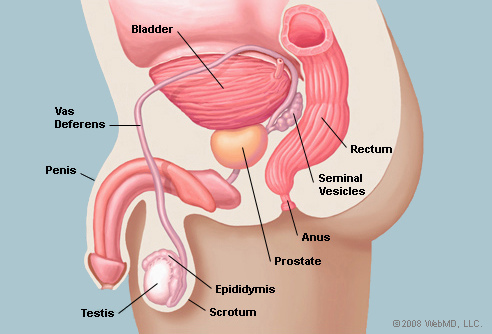
In most men, prostate cancer grows very slowly and most men will never know they have the condition. Prostate cancer can be deadly but can be cured if it’s caught early enough or it may take a lifetime to run its course. The prostate gland is located directly beneath the bladder and in front of the rectum.
At an advanced age, the risks of surgery for prostate cancer or other more radical treatments may actually be worse than the disease. Men have traditionally been less likely to seek medical attention than women, especially for minor problems which often serve as warning signs for more serious underlying illness. Prostate cancer is characterized by ‘grade’ and ‘stage’; grade is given to indicate how quickly a cancer is growing – the higher the grade, the more likely it is that the cancer will grow and spread rapidly and the size and extent of the tumor will determine its stage.
Most prostate cancer symptoms, although associated with prostate cancer, are more likely to be connected to non-cancerous conditions. There may be other symptoms not mentioned here. There are several symptoms you should be aware of.
Additional symptoms that may be associated with this disease are bone pain or tenderness, and abdominal pain. Some men will experience symptoms that might indicate the presence of prostate cancer. Blood in the urine or semen and frequent pain or stiffness in the lower back, hips, or upper thighs are often symptoms of cancer.
A chest x-ray may be done to see if there’s a spread of cancer. Urine or prostatic fluid cytology may reveal unusual cells. your doctor may use either one or two of the most common tests for prostate cancer detection.
A urinalysis may indicate if there is blood in the urine. a PSA test with a high level can also be from a non-cancerous enlargement of the prostate gland. a bone scan can indicate whether the cancer has spread or not.
Side effects of chemotherapy drugs depend on which ones you’re taking and how often and how long they’re taken. Radiation therapy to the prostate gland is either external or internal, both of which use high-energy rays to kill cancer cells and shrink tumors. Medicines can be used to adjust the levels of testosterone; called hormonal manipulation.
The conventional treatment of prostate cancer is often controversial. Impotence is a potential complication after the prostatectomy or after radiation therapy. Surgery is usually only recommended after thorough evaluation and discussion of all available treatment options.
Recent improvements in surgical procedures have made complications occur less often. anyone considering surgery should be aware of the benefits, risks and the extent of the procedure. Chemotherapy medications are often used to treat prostate cancers that are resistant to hormonal treatments.
Radiation therapy is used primarily to treat prostate cancers classified as stages a, B, or C. if chemotherapy is decided upon after the first round of chemotherapy, most men receive further doses on an outpatient basis at a clinic or physician’s office. The approaches to treatment include: ever watchful waiting to see whether the cancer is growing slowly and not causing any symptoms.
Treatment options can vary based on the stage of the tumor. an oncology specialist will usually recommend treating with a single drug or a combination of drugs.
The outcome of prostate cancer varies greatly; mostly because the disease is found in older men who may have a variety of other complicating diseases or conditions, such as cardiac or respiratory disease, or disabilities that immobilize or greatly decrease their activities. Because prostate cancer is a slow-growing disease, many men with this disease will die from other causes before they die from prostate cancer. It’s important to get as informed as possible and read all the newest books, ebooks and research available.
For more information on prostate cancer treatments and prostate cancer symptoms go to BestProstateHealthTips.com Helen Hecker R.N.’s website specializing in prostate and prostate cancer tips, advice and resources, including information on prostate tests and natural prostate cancer treatments